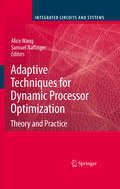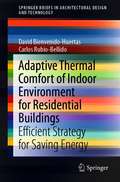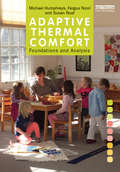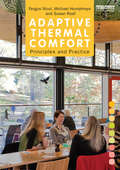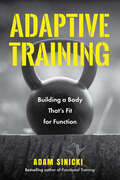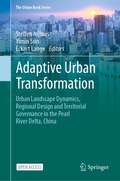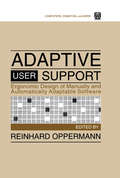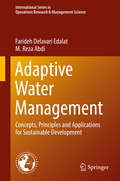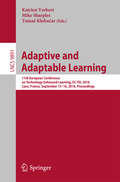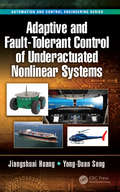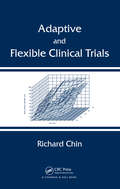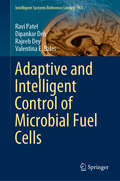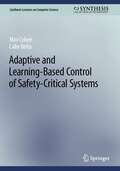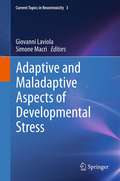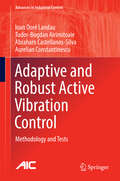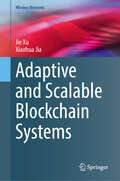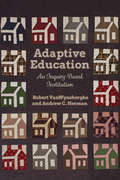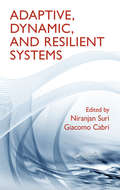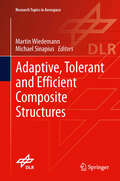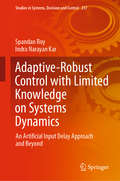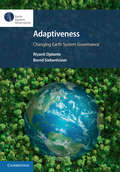- Table View
- List View
Adaptive Techniques for Dynamic Processor Optimization: Theory and Practice (Integrated Circuits and Systems)
by Alice Wang Samuel NaffzigerThis book is about various adaptive and dynamic techniques used to optimize processor power and performance. It is based on a very successful forum at ISSCC which focused on Adaptive Techniques. The book looks at the underlying process technology for adaptive designs and then examines different circuits, architecture and software that address the different aspects. The chapters are written by people both in academia and the industry to show the scope of alternative practices.
Adaptive Technologies for Training and Education
by Paula J. Durlach Alan M. LesgoldThis edited volume provides an overview of the latest advancements in adaptive training technology. Intelligent tutoring has been deployed for well-defined and relatively static educational domains such as algebra and geometry. However, this adaptive approach to computer-based training has yet to come into wider usage for domains that are less well defined or where student-system interactions are less structured, such as during scenario-based simulation and immersive serious games. In order to address how to expand the reach of adaptive training technology to these domains, leading experts in the field present their work in areas such as student modeling, pedagogical strategy, knowledge assessment, natural language processing and virtual human agents. Several approaches to designing adaptive technology are discussed for both traditional educational settings and professional training domains. This book will appeal to anyone concerned with educational and training technology at a professional level, including researchers, training systems developers and designers.
Adaptive Technology for the Internet: Making Electronic Resources Accessible to All
by Barbara T. MatesIs your site accessible? Can helen keller access your site? With all the new technology and our societies reliance on technology the demand for assistive technology increases. Read about different pieces of equipment that can make surfing the net more enjoyable for those with disabilities.
Adaptive Thermal Comfort of Indoor Environment for Residential Buildings: Efficient Strategy for Saving Energy (SpringerBriefs in Architectural Design and Technology)
by Carlos Rubio-Bellido David Bienvenido-HuertasThis book is structured in four parts: First, it analyzes the sustainability objectives established for the building stock and the importance of thermal comfort in this aspect. Second, the existing adaptive thermal comfort models and the main energy-saving measures associated with these models are analyzed. Third, the energy savings obtained with these measures are analyzed in several case studies, comparing the results obtained with other energy conservation measures, such as the improvement of the façade. The analysis is carried out from an energy and economic perspective. Finally, a decision‐making process based on fuzzy logic is established. As an expected result, the content of the book contributes to assist architects in designing more efficient buildings from the perspective of user behavior.
Adaptive Thermal Comfort: Foundations And Analysis
by Susan Roaf Michael Humphreys Fergus NicolThere has been widespread dissatisfaction with accepted models for predicting the conditions that people will find thermally comfortable in buildings. These models require knowledge about clothing and activity, but can give little guidance on how to quantify them in any future situation. This has forced designers to make assumptions about people’s future behaviour based on very little information and, as a result, encouraged static design indoor temperatures. This book is the second in a three volume set covering all aspects of Adaptive Thermal Comfort. The first part narrates the development of the adaptive approach to thermal comfort from its early beginnings in the 1960s. It discusses recent work in the field and suggests ways in which it can be developed and modelled. Such models can be used to set dynamic, interactive standards for thermal comfort which will help overcome the problems inherited from the past. The second part of the volume engages with the practical and theoretical problems encountered in field studies and in their statistical analysis, providing guidance towards their resolution, so that valid conclusions may be drawn from such studies.
Adaptive Thermal Comfort: The Designer's Guide To Adaptive Thermal Comfort
by Susan Roaf Michael Humphreys Fergus NicolThe fundamental function of buildings is to provide safe and healthy shelter. For the fortunate they also provide comfort and delight. In the twentieth century comfort became a 'product' produced by machines and run on cheap energy. In a world where fossil fuels are becoming ever scarcer and more expensive, and the climate more extreme, the challenge of designing comfortable buildings today requires a new approach. This timely book is the first in a trilogy from leaders in the field which will provide just that. It explains, in a clear and comprehensible manner, how we stay comfortable by using our bodies, minds, buildings and their systems to adapt to indoor and outdoor conditions which change with the weather and the climate. The book is in two sections. The first introduces the principles on which the theory of adaptive thermal comfort is based. The second explains how to use field studies to measure thermal comfort in practice and to analyze the data gathered. Architects have gradually passed responsibility for building performance to service engineers who are largely trained to see comfort as the ‘product’, designed using simplistic comfort models. The result has contributed to a shift to buildings that use ever more energy. A growing international consensus now calls for low-energy buildings. This means designers must first produce robust, passive structures that provide occupants with many opportunities to make changes to suit their environmental needs. Ventilation using free, natural energy should be preferred and mechanical conditioning only used when the climate demands it. This book outlines the theory of adaptive thermal comfort that is essential to understand and inform such building designs. This book should be required reading for all students, teachers and practitioners of architecture, building engineering and management – for all who have a role in producing, and occupying, twenty-first century adaptive, low-carbon, comfortable buildings.
Adaptive Training: Building a Body That's Fit for Function
by Adam SinickiEvolutionary Lifestyle Fitness Strategies“Definitely one of the most holistic fitness and training personalities of the modern era.” ─Amazon review #1 New Release in Physical Education and Stretching Exercise & FitnessAdaptive Training explores an alternate perspective on health and fitness focusing on how we are a product of the environment. So change your surroundings to maximize your health and fitness beyond the gym.Explore your amazingly adaptable body. Tight hip flexors, rounded shoulders and a hunched back are all products of our daily lifestyles. We are adaptoids; our bodies are designed to adapt to our surroundings, and understanding this is the key to unlocking perfect performance. Adaptive Training takes you through the fundamentals of understanding adaptive training while providing a detailed physical fitness program to help you build an environment that facilitates a healthy and empowering new lifestyle fitness journey with new lifestyle fitness equipment.Unlock your true potential. The best way to learn a language is through immersion, and the same is true for developing and maintaining a new lifestyle fitness. A few hours a week training at the gym or elsewhere is great, but what if your environment outside of the gym is also challenging your body? You will see results that are only possible through the innovative fitness method called “Adam” which stands for Adaptive Immersion Training. Change your environment with intent, and your body will adapt with amazing results.Inside, you’ll learn:How the environment shapes your body to be adaptiveHow and why you should divide training throughout the dayThe missing fundamentals of human movement and lifestyle fitness equipmentIf you are a fan of Adam Sinicki's Functional Training and Beyond or liked Tactical Barbell, Built from Broken, The Comfort Crisis, or What Doesn’t Kill You, you’ll love Adaptive Training.
Adaptive Urban Transformation: Urban Landscape Dynamics, Regional Design and Territorial Governance in the Pearl River Delta, China (The Urban Book Series)
by Steffen Nijhuis Eckart Lange Yimin SunThis open access book provides a cross-sectoral, integrative and multi-scale design and planning approach for adaptive urban transformation of fast urbanising deltas, taking the Pearl River Delta (China) as a case study. Deltaic areas are among the most promising regions in the world. Their strategic location and superior quality of their soils are core factors supporting both human development and the rise of these regions as global economic hubs. At the same time, however, deltas are extremely vulnerable to multiple threats from both climate change and urbanisation. These include an increased flood risk combined with the resulting loss of ecological and social-cultural values. To ensure a more sustainable future for these areas, spatial strategies are needed to strengthen resilience, i.e. help the systems to cope with their vulnerabilities as well as enhance their capacity to overcome natural and artificial threats.The book provides a unique approach that integrates research in urban landscape systems, territorial governance and visualisation techniques that will help to achieve more integrated and resilient deltas. Based on an assessment of the dynamics of change regarding the transformational cycles of natural and urban landscape elements, eco-dynamic regional design strategies are explored to reveal greater opportunities for the exploitation of natural and social-cultural factors within the processes of urban development.
Adaptive User Support: Ergonomic Design of Manually and Automatically Adaptable Software
by Reinhard OppermannThe potential of software applications to solve an array of office and administrative problems is increasing faster than the ability of users to exploit it. We need to make systems easier to learn and more comfortable to use. This book reports a major advance in the effort to accomplish both goals. Flexcel enables users to modify access and dialog dynamics to their specific requirements. Relying on a plan recognition feature, the system proposes adaptations or uses of adaptations. The ongoing conflict between the adaptive and the adaptable is resolved in an integration: user and system share the responsibility for the initiatives, decision-making and execution. A "critic" component of the system then analyzes the user's handling of the adaptation tools and suggests improvements. The system offers an environment in which users can explore as they learn. HyPlan implements the context-sensitive help that facilitates learning on demand. When the PLANET plan-recognition feature identifies the kinds of support for work that may possibly be required, HyPlan provides, on request, specific assistance in the form of hypermedia or animated displays and tutorials. Developmental research has shown that users take advantage of opportunities to adapt interfaces only in conjunction with help-functions -- which are accepted when they do not interrupt work. And studies by social scientists have shown that adaptations of technical systems have to be integrated into the overall process of organizational innovation and undertaken cooperatively. This book will stimulate all those concerned with software -- from computational, cognitive, ergonomic, or organizational standpoints -- to reconceive the relationship between design and user support.
Adaptive Water Management: Concepts, Principles and Applications for Sustainable Development (International Series in Operations Research & Management Science #258)
by Farideh Delavari Edalat M. Reza AbdiThis book explores a new framework of Adaptive Water Management (AWM) for evaluating existing approaches in urban water management. It highlights the need to adopt multidisciplinary strategies in water management while providing an in-depth understanding of institutional interactions amongst different water related sectors. The key characteristics of AWM i. e. polycentric governance, organisational flexibility and public participation are investigated and described through a critical review of the relevant literature. The book presents an empirical case study undertaken in a selected developing-country city to investigate the potential gaps between the current water management approaches and possible implementation of AWM. Feasibility of AWM operations is examined in an environment surrounded by established water management structure with centralised governance and an institutional process based on technical flexibility. The key elements of AWM performance are (re)structured and transformed into decision support systems. Multi criteria decision models are developed to facilitate quantification and visualization of the elements derived from the case study, which is involved with water companies and water consumers. The book describes how the concept of AWM, along with structuring suitable decision support systems, can be developed and applied to developing-country cities. The book highlights the barriers for applying the AWM strategies that include established centralised decision making, bureaucratic interactions with external organisations, lack of organisational flexibility within the institutions, and lack of recognition of public role in water management. The findings outline that despite the lack of adaptability in the current water management in the case study, as an example of developing countries, there are positive attitudes among water professionals and the public towards adaptability through public-institutional participation. /p>
Adaptive Web Design: Crafting Rich Experiences with Progressive Enhancement
by Aaron GustafsonBuilding an elegant, functional website requires more than just knowing how to code. In Adaptive Web Design, Second Edition, you'll learn how to use progressive enhancement to build websites that work anywhere, won't break, are accessible by anyone--on any device--and are designed to work well into the future. This new edition of Adaptive Web Design frames even more of the web design process in the lens of progressive enhancement. You will learn how content strategy, UX, HTML, CSS, responsive web design, JavaScript, server-side programming, and performance optimization all come together in the service of users on whatever device they happen to use to access the web. Understanding progressive enhancement will make you a better web professional, whether you're a content strategist, information architect, UX designer, visual designer, front-end developer, back-end developer, or project manager. It will enable you to visualize experience as a continuum and craft interfaces that are capable of reaching more users while simultaneously costing less money to develop. When you've mastered the tenets and concepts of this book, you will see the web in a whole new way and gain web design superpowers that will make you invaluable to your employer, clients, and the web as a whole. Visit http://adaptivewebdesign. info to learn more.
Adaptive Wireless Communications
by Daniel W. Bliss Siddhartan GovindasamyAdopting a balanced mix of theory, algorithms and practical design issues, this comprehensive volume explores cutting-edge applications in adaptive wireless communications and the implications these techniques have for future wireless network performance. Presenting practical concerns in the context of different strands from information theory, parameter estimation theory, array processing and wireless communication, the authors present a complete picture of the field. Topics covered include advanced multiple-antenna adaptive processing, ad hoc networking, MIMO, MAC protocols, space-time coding, cellular networks and cognitive radio, with the significance and effects of both internal and external interference a recurrent theme throughout. A broad, self-contained technical introduction to all the necessary mathematics, statistics, estimation theory and information theory is included, and topics are accompanied by a range of engaging end-of-chapter problems. With solutions available online, this is the perfect self-study resource for students of advanced wireless systems and wireless industry professionals.
Adaptive and Adaptable Learning: 11th European Conference on Technology Enhanced Learning, EC-TEL 2016, Lyon, France, September 13-16, 2016, Proceedings (Lecture Notes in Computer Science #9891)
by Katrien Verbert Tomaž Klobučar Mike SharplesThis book constitutes the proceedings of the 11th European Conference on Technology Enhanced Learning, EC-TEL 2016, held in Lyon, France, in September 2016. The 26 full papers, 23 short papers, 8 demo papers, and 33 poster papers presented in this volume were carefully reviewed and selected from 148 submissions.
Adaptive and Fault-Tolerant Control of Underactuated Nonlinear Systems (Automation and Control Engineering)
by Yong-Duan Song Jiangshuai HuangThe purpose of the book is to provide an exposition of recently developed adaptive and fault-tolerant control of underactuated nonlinear systems. Underactuated systems are abundant in real life, ranging from landing vehicles to surface ships and underwater vehicles to spacecrafts. For the tracking and stabilization control of underactuated mechanical systems, many methodologies have been proposed. However, a number of important issues deserve further investigation. In response to these issues, four important problems are solved in this book, including control of underactuated nonlinear systems with input saturation, output-feedback control in the presence of parametric uncertainties, fault-tolerant control of underactuated ships with or without actuator redundancy, and adaptive control of multiple underactauted nonlinear systems, including formation control and flocking control of multiple underactuated systems.
Adaptive and Flexible Clinical Trials
by Richard ChinAdaptive clinical trial designs, unlike traditional fixed clinical trial designs, enable modification of studies in response to the data generated in the course of the trial. This often results in studies that are substantially faster, more efficient, and more powerful. Recent developments in web-based real-time data entry and advances in statistic
Adaptive and Intelligent Control of Microbial Fuel Cells
by Rajeeb Dey Valentina E. Balas Dipankar Deb Ravi PatelThis book addresses a range of solutions and effective control techniques for Microbial Fuel Cells (MFCs), intended as a response to the increased energy consumption and wastewater production stemming from globalization. It describes the fundamentals of MFCs and control-oriented mathematical models, and provides detailed information on uncertain parameters. Various control techniques like robust control with LMI, adaptive backstepping control, and exact linearization control are developed for different mathematical models. <P><P> In turn, the book elaborates on the basics of adaptive control, presenting several methods in detail. It also demonstrates how MFCs can be developed at the laboratory level, equipping readers to develop their own MFCs for experimental purposes. In closing, it develops a transfer function model for MFCs by combining a system identification technique and model reference adaptive control techniques. By addressing one of the most promising sources of clean and renewable energy, this book provides a viable solution for meeting the world’s increasing energy demands.
Adaptive and Learning-Based Control of Safety-Critical Systems (Synthesis Lectures on Computer Science)
by Calin Belta Max CohenThis book stems from the growing use of learning-based techniques, such as reinforcement learning and adaptive control, in the control of autonomous and safety-critical systems. Safety is critical to many applications, such as autonomous driving, air traffic control, and robotics. As these learning-enabled technologies become more prevalent in the control of autonomous systems, it becomes increasingly important to ensure that such systems are safe. To address these challenges, the authors provide a self-contained treatment of learning-based control techniques with rigorous guarantees of stability and safety. This book contains recent results on provably correct control techniques from specifications that go beyond safety and stability, such as temporal logic formulas. The authors bring together control theory, optimization, machine learning, and formal methods and present worked-out examples and extensive simulation examples to complement the mathematical style of presentation. Prerequisites are minimal, and the underlying ideas are accessible to readers with only a brief background in control-theoretic ideas, such as Lyapunov stability theory.
Adaptive and Maladaptive Aspects of Developmental Stress (Current Topics in Neurotoxicity #3)
by Giovanni Laviola Simone MacrìSince the very early stages of life, we all experience some form of stress. Stressors can be mild to severe and can range from unsuccessfully longing for maternal milk in infancy, to recklessly wiggling on a motorbike to be on time to watch the NBA finals on TV, to breaking up a relationship. All those events that we call "stress" have the capability of perturbing a given state of psychological and physiological equilibrium and moving it to a different level. The transition from crawling to walking has to be considered a form of stress as much as losing a job. It is through a continuous cross-talk between environmental stressors and individual adaptations that we build our personalities and our ways to cope with daily hassles. External challenges should not necessarily be regarded as "bad", but instead seen as constructive forces forming our ability to navigate a changing world. What is stress good for? What is stress bad for? When and why do we need to be "stressed"? Should we worry about stress? When does stress equate to "normality"? When does it turn into pathology? We hope with this book to provide some answers to these fundamental questions.
Adaptive and Robust Active Vibration Control: Methodology and Tests (Advances in Industrial Control)
by Ioan Doré Landau Tudor-Bogdan Airimițoaie Abraham Castellanos-Silva Aurelian ConstantinescuThis book approaches the design of active vibration control systems from the perspective of today s ideas of computer control. It formulates the various design problems encountered in the active management of vibration as control problems and searches for the most appropriate tools to solve them. The experimental validation of the solutions proposed on relevant tests benches is also addressed. To promote the widespread acceptance of these techniques, the presentation eliminates unnecessary theoretical developments (which can be found elsewhere) and focuses on algorithms and their use. The solutions proposed cannot be fully understood and creatively exploited without a clear understanding of the basic concepts and methods, so these are considered in depth. The focus is on enhancing motivations, algorithm presentation and experimental evaluation. MATLAB(r)routines, Simulink(r) diagrams and bench-test data are available for download and encourage easy assimilation of the experimental and exemplary material. Three major problems are addressed in the book: active damping to improve the performance of passive absorbers;adaptive feedback attenuation of single and multiple tonal vibrations; andfeedforward and feedback attenuation of broad band vibrations. Adaptive and Robust Active Vibration Control will interest practising engineers and help them to acquire new concepts and techniques with good practical validation. It can be used as the basis for a course for graduate students in mechanical, mechatronics, industrial electronics, aerospace and naval engineering. Readers working in active noise control will also discover techniques with a high degree of cross-over potential for use in their field. "
Adaptive and Scalable Blockchain Systems (Wireless Networks)
by Xiaohua Jia Jie XuThis book systematically studies blockchain adaptability and scalability, combining theoretical analysis with practical implementation. The book provides a comprehensive exploration of blockchain adaptability and scalability solutions through six chapters. Chapter 1 introduces blockchain overviews and current scalability challenges, emphasizing the need for adaptive and scalable blockchains. Chapter 2 systematically reviews consensus protocols, from classical BFT to modern PoW, PoS, and sharding approaches, setting the theoretical foundation for subsequent chapters. Chapter 3 presents AdaptPoW, which enhances PoW blockchain adaptability and scalability through dynamic structure adjustment and efficient transaction processing. Chapter 4 presents AdaptPoS, a PoS-based system with role decoupling and filter mechanism, enabling dynamic throughput adjustment while maintaining security. Chapter 5 describes AdaptShard for sharding-based blockchains, including its transaction allocation and optimistic processing strategy for cross-shard transactions. Chapter 6 concludes with insights and future research directions.
Adaptive education: An Inquiry-Based Institution
by Robert Vanwynsberghe Andrew C. HermanThe obstacles that prevent the latest educational research reaching the classroom are daunting: few channels to communicate the results of educational research, fewer opportunities for teachers to participate in research themselves, and little support for honing a scientific approach to teaching. The solution, according to Robert VanWynsberghe and Andrew C. Herman, is radical but simple: transform the educational institution itself into a laboratory for continuous experimentation. Inspired by the pragmatist theories of John Dewey and Roberto Unger, Adaptive Education explains how schools and universities can incorporate research processes into their activities, institutionalize a policy of inquiry and experimentation, and make teaching an evidence-based profession. An audacious proposal to reform the education system from the ground up, Adaptive Education is a roadmap for creating an institution that empowers teachers, parents, and the community to innovate, adapt, and explore.
Adaptive, Dynamic, and Resilient Systems
by Niranjan Suri Giacomo CabriAs the complexity of today's networked computer systems grows, they become increasingly difficult to understand, predict, and control. Addressing these challenges requires new approaches to building these systems. Adaptive, Dynamic, and Resilient Systems supplies readers with various perspectives of the critical infrastructure that systems of netwo
Adaptive, tolerant and efficient composite structures: Adaptive, Tolerant And Efficient Composite Structures (Research Topics in Aerospace)
by Martin Wiedemann Michael SinapiusComposite structures are most efficient in performance and production cost when combined with smart materials making them adaptable to changing operational conditions. The specific production processes of composites offer the possibility to integrate more functions thus making the structure more valuable. Active functions can be realized by smart materials, e.g. morphing, active vibration control, active structure acoustic control or structure health monitoring. The foundation is a sound understanding of materials, design methods, design principles, production technologies and adaptronics. Along the complete process chain this disciplines together deliver advanced lightweight solutions for applications ranging from mechanical engineering to vehicles, airframe and finally space structures. This book provides the scientific foundations as well as inspiring new ideas for engineers working in the field of composite lightweight structures.
Adaptive-Robust Control with Limited Knowledge on Systems Dynamics: An Artificial Input Delay Approach and Beyond (Studies in Systems, Decision and Control #257)
by Spandan Roy Indra Narayan KarThe book investigates the role of artificial input delay in approximating unknown system dynamics, referred to as time-delayed control (TDC), and provides novel solutions to current design issues in TDC. Its central focus is on designing adaptive-switching gain-based robust control (ARC) for a class of Euler–Lagrange (EL) systems with minimal or no knowledge of the system dynamics parameters. The newly proposed TDC-based ARC tackles the commonly observed over- and under-estimation issues in switching gain. The consideration of EL systems lends a practical perspective on the proposed methods, and each chapter is supplemented by relevant experimental data. The book offers a unique resource for researchers in the areas of ARC and TDC alike, and covers the state of the art, new algorithms, and future directions.
Adaptiveness: Changing Earth System Governance
by Bernd Siebenhüner Riyanti DjalanteRapid and transformational actions are ever more urgently needed to achieve a just, resilient, and ecologically sustainable global society, as envisioned and supported by the Sustainable Development Goals. Moreover, dynamic governance approaches are vital for addressing changing and uncertain conditions. At many levels, governance needs to be responsive and flexible - in one word - adaptive. This book provides a state-of-the-art review of the conceptual development of adaptiveness as a key concept in the environmental governance literature, complemented by applications from global, regional, and national levels. It reviews the politics of adaptiveness, investigates which governance processes foster adaptiveness, and discusses how, when and why adaptiveness influences earth system governance. It is a timely synthesis for students, researchers and practitioners interested in environmental governance, sustainability and social change processes. This is one of a series of publications associated with the Earth System Governance Project. For more publications, see www.cambridge.org/earth-system-governance.
